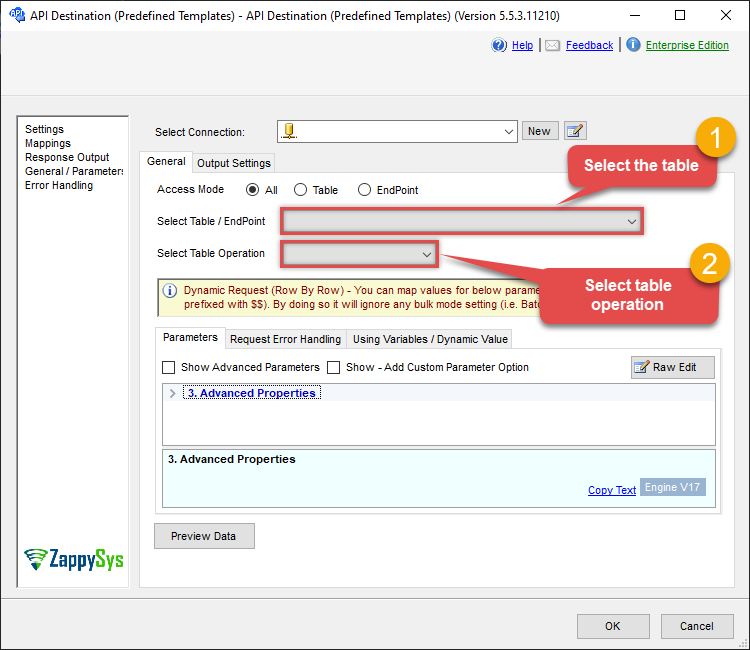List events
Name
list_events
Description
Related Tables
Parameters
| Parameter | Label | Required | Options | Description |
|---|---|---|---|---|
| CalendarId | CalendarId | YES |
Output Columns
| Label | Data Type (SSIS) | Data Type (SQL) | Length | Raw | Description |
|---|---|---|---|---|---|
| Id |
DT_WSTR
|
nvarchar(300)
|
300 | False |
|
| Kind |
DT_WSTR
|
nvarchar(300)
|
300 | False |
|
| Status |
DT_WSTR
|
nvarchar(300)
|
300 | False |
|
| HtmlLink |
DT_WSTR
|
nvarchar(1000)
|
1000 | False |
|
| CreatedAt |
DT_DBTIMESTAMP
|
datetime
|
False |
||
| UpdatedAt |
DT_DBTIMESTAMP
|
datetime
|
False |
||
| Summary |
DT_WSTR
|
nvarchar(300)
|
300 | False |
|
| Description |
DT_WSTR
|
nvarchar(4000)
|
4000 | False |
|
| CreatorEmail |
DT_WSTR
|
nvarchar(300)
|
300 | False |
|
| OrganizerEmail |
DT_WSTR
|
nvarchar(300)
|
300 | False |
|
| OrganizerDisplayName |
DT_WSTR
|
nvarchar(300)
|
300 | False |
|
| StartsAt |
DT_DBTIMESTAMP
|
datetime
|
False |
||
| StartTimeZone |
DT_WSTR
|
nvarchar(300)
|
300 | False |
|
| EndsAt |
DT_DBTIMESTAMP
|
datetime
|
False |
||
| EndTimeZone |
DT_WSTR
|
nvarchar(300)
|
300 | False |
|
| Attendees |
DT_NTEXT
|
nvarchar(MAX)
|
False |
Input Columns
| Label | Data Type (SSIS) | Data Type (SQL) | Length | Raw | Description | ||||||||||||||||||||||||||||||||||||||||||||||||||||||||||||||||||||||||||||||||||||||||||||||
|---|---|---|---|---|---|---|---|---|---|---|---|---|---|---|---|---|---|---|---|---|---|---|---|---|---|---|---|---|---|---|---|---|---|---|---|---|---|---|---|---|---|---|---|---|---|---|---|---|---|---|---|---|---|---|---|---|---|---|---|---|---|---|---|---|---|---|---|---|---|---|---|---|---|---|---|---|---|---|---|---|---|---|---|---|---|---|---|---|---|---|---|---|---|---|---|---|---|---|---|
| There are no Static columns defined for this endpoint. This endpoint detects columns dynamically at runtime. | |||||||||||||||||||||||||||||||||||||||||||||||||||||||||||||||||||||||||||||||||||||||||||||||||||
Examples
SSIS
Use Google Calendar Connector in API Source component to read data or in API Destination component to read/write data:
Read from Events table using API Destination
This Endpoint belongs to Events table, therefore you cannot work with it directly. Use this table and table-operation pair instead:

ODBC application
Use these SQL queries in your ODBC application data source:
List events
SELECT * FROM list_events
WITH
(
"CalendarId" = 'abcd-1234-calendarid'
)List events
Lists events
SELECT * FROM Events
WITH (CalendarId='MyCalendarId')
list_events endpoint belongs to
Events
table(s), and can therefore be used via those table(s).
SQL Server
Use these SQL queries in SQL Server after you create a data source in Data Gateway:
List events
DECLARE @MyQuery NVARCHAR(MAX) = 'SELECT * FROM list_events
WITH
(
"CalendarId" = ''abcd-1234-calendarid''
)';
EXEC (@MyQuery) AT [LS_TO_GOOGLE_CALENDAR_IN_GATEWAY];List events
Lists events
DECLARE @MyQuery NVARCHAR(MAX) = 'SELECT * FROM Events
WITH (CalendarId=''MyCalendarId'')';
EXEC (@MyQuery) AT [LS_TO_GOOGLE_CALENDAR_IN_GATEWAY];
list_events endpoint belongs to
Events
table(s), and can therefore be used via those table(s).
